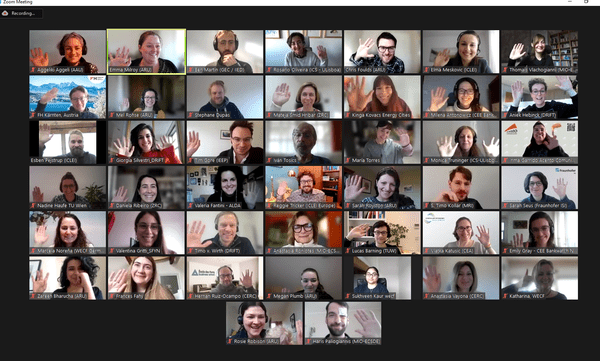SHARED GREEN DEAL project begins work

At a kick-off meeting on 1-2 February 2022, partners of the SHARED GREEN DEAL project, met for the first time to begin their mission to support a people-centred European Green Deal. The endeavour, which is coordinated by ARU, will last for five years.
The kick-off was in many ways like those of all other European projects, and mainly focused on sharing with one another the plans for the different Work Packages (WPs) — European lingo for the groupings into which partners are placed for different types of work.
In SHARED GREEN DEAL, the following Work Packages are included:
Work Package 1: Scoping
This group, led by DRIFT for Transition, will support the other partners through scoping what other researchers/practitioners have already experimented with on Green Deal policy areas. This knowledge will be used to create an online database. The WP is also responsible for connecting with the other H2020 projects supporting the Green Deal and co-producing transition pathways (i.e. targeted strategies for change) for the other Work Packages.
Work Package 2: Methodology and planning of social experiments
This group, led by Anglia Ruskin University (ARU), will benefit from the scoping in Work Package 1 and will work closely with the European Commission to finalise the scope for the social experiments. It will also establish research protocols and implementation plans related to the experiments .
Work Package 3: Social experiments on Green Deal topics
This group, led by Energy Cities, will implement plans from Work Package 2 to work closely with citizens and professionals across the selected experiments. This group will manage the six specific experiment streams – Clean Energy, Circular Economy, Efficient Renovations, Sustainable Mobility, Sustainable Food, Preserving Biodiversity – each spanning the EU’s four regions (N, S, E, W), leading to 24 experiments.
Work Package 4: Green Deal topic analyses
This group, led by Anglia Ruskin University (ARU), will consist of experts analysing all the results of Work Package 3, using specific Social Sciences and Humanities theories for each priority. The conclusions will be shared with the European Commission and include analyses concerning what has worked well/less well in the experiments, how individual and collective behaviour change was enabled, and consideration of sociotechnical issues (such as….).
Work Package 5: Cross-topic comparisons
This group, led by ICS-ULisboa, brings threads together across all the topics covered in SHARED GREEN DEAL. This will include analysing all of the topics focusing, for example, onspecific Social Sciences and Humanities themes such as Gender and diversity; Justice, vulnerabilities and inequalities; Societal challenges post-COVID-19; Governance agendas, conventions and framings; Geographic differences and evolutions across time. This group will also deliver output for the Climate Action and Zero Pollution Priorities of SHARED GREEN DEAL.
Work Package 6: Impact evaluation and RRI integration
This group, led by FRAUNHOFER ISI, will proactively ensure that Responsible Research & Innovation (RRI) best practice is embedded within the project’s planning and setup, as well as reactively used in the evaluation of its own activities. Qualitative and quantitative evaluation methods will be used, covering both internal organisation and external engagements. Clear recommendations for how aSHARED GREEN DEAL Network can be established and achieve maximum impact will be produced.
Work Package 7: Network creation and launch
This group, led by ALDA - European Association for Local Democracy, will establish and launch the new SHARED GREEN DEAL Network building on the results achieved in the project and including various stakeholders, to stimulate shared (behavioural, social and cultural change) actions on Green Deal initiatives at local, regional and international levels. The Network is planned for launch in 2026.
Work Package 8: Policy and governance
This group, led by Institute for European Environmental Policy (IEEP), will ensure policy actors are involved in dialogue from the start, and are part of producing the outputs from SHARED GREEN DEAL. The work will include analyses of governance processes, such as utilising experiment results to inform a scoring methodology for social, cultural and behavioural policy/governance approaches, resulting in actionable, citizen-led recommendations.
WP9 Communications, dissemination and exploitation
This group, led by ICLEI Europe, will strive to make the project available to targeted audiences in the rest of the world, and make the outputs useful for the many members of SHARED GREEN DEAL's Network partners, citizens, business professionals, academics, local community organisations and policy workers at different levels.
WP10 Project management and coordination
This group, led by Anglia Ruskin University (ARU) is coordinating the 22 partners in the collaboration and has primary responsibility for ensuring and maintaining dialogue with the European Commission as the founder of the SHARED GREEN DEAL project and initiator of the Green Deal across Europe.


CONTACT
For further details please contact co-leads Professor Chris Foulds (chris.foulds@aru.ac.uk) and Professor Rosie Robison (rosie.robison@aru.ac.uk).

This project has received funding from the European Union’s Horizon 2020 research and innovation program under grant agreement No 101036640. The sole responsibility for the content of this website lies with the SHARED GREEN DEAL HAS project and does not necessarily reflect the opinion of the European Union.